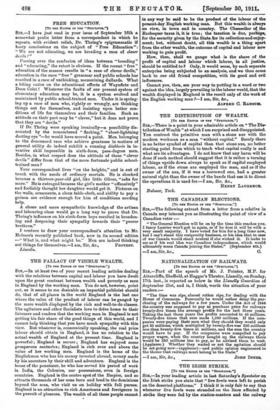THE FALLACY OF VISIBLE WEALTH.
[To THE EDITOR OF THE " SPECTITOR7.1 SIR,—In at least two of your recent leading articles dealing with the relations between capital and labour you have dwelt upon the great contrast between wealth and poverty as seen in England by the working man. You do not, however, point out, as it seems to me desirable an impartial publicist should do, that of all places in the world England is the last one where the value of the product of labour can be gauged by the mere wealth displayed by the rich and well-to-do classes. The agitators and other Socialists love to drive home to their listeners and readers that the working man in England is not getting his fair share of the good things of this world, and I cannot help thinking that you have much sympathy with this view. But whatever is, economically speaking, the real price labour should obtain in England, it has no relation to the actual wealth of England at the present time. England is powerful ; England is secure ; England has enjoyed some prosperous centuries; England is rich over and above the value of her working men. England is the home of the Englishman who has his money invested abroad, money made by his ancestors by their skill and adventure. England is the home of the pensioner, he who has served his period of work in India, the Colonies, our possessions, even in foreign countries. England is the centre spot of the Empire, and so attracts thousands of her sons born and bred in the dominions beyond the seas, who visit us on holiday with full purses. England is an attraction to rich Americans and foreigners in the pursuit of pleasure. The wealth of all these people cannot
in any way be said to be the product of the labour of the present-day English working man. But this wealth is always on view, in town and in country. The Chancellor of the Exchequer taxes it, it is true ; the taxation is due, perhaps, for the security given by the State or its collection and enjoy- ment; but, without doubt, all this wealth is a thing apart from the other wealth, the outcome of capital and labour now working to gain profit.
How, then, shall we gauge what is the share of the profit of capital and labour which labour, in all justice, should be entitled to ? Only, it would seem, by each separate enterprise being subjected to an analysis, and we then come back to our old friend competition, with its good and evil influences.
Cannot you, then, see your way to putting in a word or two against the idea, largely prevailing in the labour world, that the wealth displayed in England is the result only of the work of the English working man ?—I am, Sir, &e., ALFRED C. RANSOM.










































 Previous page
Previous page